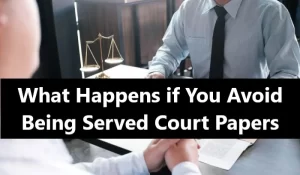Can Family Court Send You to Jail?
Family court handles all matters related to divorce, child custody, child support, and other domestic disputes. As a court of law with judicial authority, family court can enforce its orders and punish non-compliance through civil contempt powers – including sending people to jail.
While family court seeks to resolve family disputes through agreement between parties when possible, jailing is an option when all else fails. Understanding how you could end up in jail from family court can help you avoid that serious consequence.
What is Family Court?
Family court, sometimes called domestic relations court, is a specific court that handles legal family issues such as divorce, child custody, visitation rights, child support, spousal support (alimony), and enforcement of domestic violence restraining orders. The judges who preside over family court have specialized knowledge and experience with family law and domestic disputes.
The purpose of family court is to provide families with an efficient forum to resolve marital and child-related legal matters, ideally by promoting agreement between the parties when possible through things like mediation. But family court judges do have the power to make binding decisions and enforce compliance when needed, including through punishments like jail time.
Reasons Why Family Court Can Send You to Jail
There are several reasons that family court can send someone to jail, which typically involves punishable offenses like:
- Failure to pay child support – Parents are legally required to financially support minor children. If the court orders child support and you fail to pay without sufficient excuse, the judge can potentially send you to jail for contempt until payments are made.
- Failure to pay spousal support/alimony – In some cases, the higher earning spouse will be ordered to pay support to the lower earning spouse after divorce. Again, failure to comply can result in jail time.
- Violating custody agreements – Custody orders mandating when each parent has the children are meant to be strictly followed. One parent denying the other’s court-ordered parenting time may face jail for contempt.
- Violating restraining orders – Family court often issues orders of protection in cases of domestic violence or abuse. Breaking the restraining order can result in jail time.
- Contempt of court – Disobeying family court orders, being disruptive in court, or showing disrespect towards the judge are all punishable with jail for contempt.
So issues like ongoing non-payment of support, custody interference, and violating restraining orders may result in family court jailing in order to coerce compliance. The judge has discretion in ordering jail time.
The Process of Being Sent to Jail by Family Court
There is a process that takes place before family court can send someone to jail:
- Notice of hearing – The court provides notice of a hearing date where the alleged non-compliance will be addressed.
- Opportunity to explain failure to comply – At the hearing, the accused individual can explain why they failed to follow court orders, and try to remedy the issues.
- Judge decides on punishment – The judge will decide whether jail time is appropriate based on the offense and any offered excuses.
Most people sent to jail by family court are only held for a short time until they comply with monetary obligations or court orders. But the judge can impose longer jail sentences in certain situations.
How Long You Can Be Sent to Jail
How long you can actually be sentenced to jail for from family court depends on each state’s laws. In many states, family court contempt powers are limited to relatively short jail sentences of a few days or weeks. The purpose is usually to coerce compliance rather than solely punish.
But some states allow family court judges to impose jail sentences measured in months when warranted, especially for repeated refusal to comply with orders like child support. Rarely would a family court jail sentence be years long, however.
So while family court jail time may only last a few weeks in order to establish consequences and gain compliance, state laws ultimately dictate how long you could be jailed.
Avoiding Jail Time from Family Court
To avoid being sent to jail by family court:
- Comply with all orders – It may be difficult, but abiding fully with all support orders, custody arrangements, and protective orders is key.
- Communicate openly with ex-spouse – Ongoing transparent discussions about issues can resolve many would-be disputes.
- Seek modifications if needed – If the orders become unworkable, proactively seek legal modifications.
- Get legal help if struggling – An attorney can help you navigate family court obligations.
- Attend all hearings – Never miss a court date or you may face immediate jail time.
With good legal advice and making diligent efforts to comply, you can likely avoid the harshest outcome of family court – being sent to jail.
Life in Jail After Family Court Sentencing
If family court orders jail time, you will be transferred from court to the local jail for processing and to serve your sentence. The conditions in jail are often harsh:
- Jail cells are small and cramped, often holding two to four inmates in close quarters. Privacy is severely limited.
- amenities and comforts are very sparse in jail – just concrete or metal bunks to sleep on and plain food to eat.
- You may be isolated from family and friends during incarceration, only able to interact during strict visitation times. Phone access is limited too.
- Jail disciplines inmates with further restrictions or solitary confinement. Danger and violence is possible being confined with criminal offenders.
Going to jail means losing your freedom and precious time with loved ones. Even short family court jail sentences can jeopardize jobs, finances, and relationships. It’s a frightening possibility.
Getting Out of Jail After Family Court Sentencing
If jailed by family court, there are a few ways you can get released:
- Lawyer can file motion for early release – Your attorney may request your release by proving compliance with court orders.
- Complying with orders – The judge may release you once you start paying owed child support for example.
- Serving full sentence – If no early release granted, you must serve the full jail time ordered.
Getting out of jail may require proving to the judge that you now intend to fully comply with all family court orders. Jail is meant to compel compliance in family court cases.
Conclusion and Key Takeaways
In conclusion, family court does have the authority to send you to jail for failure to abide by its orders related to divorce, child support, custody, and protection orders. Reasons like not paying support, contempt of court, or violating restraining orders could land you in jail, typically for short sentences, but sometimes for months depending on state laws.
To avoid jail time, strictly follow all family court mandates, seek order modifications proactively if needed, and maintain open and respectful communications with your former spouse. With good legal guidance, you can steer clear of jail and achieve a fair resolution of your family law case.
FAQs
1. Can family court send you to jail for adultery?
No, adultery itself is not a jailable offense in family court. However, it may factor into issues like the division of marital assets during divorce proceedings.
2. What happens if you refuse to pay child support?
Refusing to pay court-ordered child support can potentially result in jail time after being found in contempt of court. Jail serves to compel compliance with support obligations.
3. How do I avoid contempt of court in family court?
You avoid contempt by fully complying with all family court orders, maintaining civility in court, and communicating proactively with your ex-spouse to address any disputes.
4. What is the maximum jail sentence from family court?
It varies by state, but family court jail sentences are typically short – a few weeks or months. Longer sentences are rare and depend on the laws in your jurisdiction.
5. Should I get a lawyer for family court?
Yes, consulting with an experienced family law attorney can help ensure you understand your rights and obligations. A lawyer can guide you to avoid violations resulting in jail.







